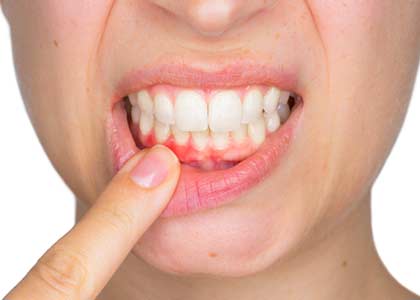Indianapolis, IN dentist describes periodontal disease stages and the treatments available
Patients in the Indianapolis, IN area seeking a dentist who provides periodontal care are welcome to visit the practice of Dr. Matthew Church. His facility offers a variety of services, including the prevention, diagnosis, and treatment of gum disease. Our dentist describes to patients the various stages of periodontal disease and the effective treatments used to achieve a healthy smile.

Understanding periodontal disease
First and foremost, patients need to have an understanding of how periodontal disease occurs. Periodontal disease, also known as gum disease, is a condition that can develop within the smile due to poor oral health habits. Patients who do not brush and floss their teeth properly, or visit their dentist on a routine basis, may be putting themselves at risk for developing periodontal disease. It is a condition that, once it develops, it cannot be cured, so prevention of the infection is highly encouraged. This infection begins in the gum tissues, and the earlier stage, called gingivitis, is characterized by the following signs and symptoms:
- Bleeding gums
- Red, swollen gum tissue
- Persistent bad breath
- Pocket development between gums and teeth
A dentist who sees patients for an evaluation will be able to spot the signs of periodontal disease during an examination. He may also ask patients about any concerns they may have to provide a proper diagnosis. Once the condition has been diagnosed, it should be treated as soon as possible to help bring the smile back to health and wellness. Diagnosis may occur at any stage, including the earlier stage of gingivitis or the later stages of severe periodontitis.
Which treatment is appropriate?
There are various ways in which Dr. Matthew Church may approach the treatment of a patient with periodontal disease. He first takes into consideration the stage the condition has reached. The earlier stage of gingivitis is rather simple to treat for most patients when caught early. It may involve a simple, but thorough, cleaning of the teeth and gums to remove plaque and tartar. However, when patients fail to take care of their smile and allow the condition to progress, they may need more aggressive treatments. This may include scaling and root planing. This cleans not only the surfaces of the teeth and gums, but also the roots of the teeth. It is a more invasive procedure but can provide dramatic benefits. Additionally, a dentist may also combine any of these services with antibiotics. Antibiotics are used to control the infection itself. Antibiotics may be administered directly onto the gums for immediate treatment or may be prescribed for a patient to take orally for a specific period. By combining various treatments, the dentist may be able to address the problem faster.
How can I prevent periodontal disease from developing?

Prevention is key to avoiding the development of periodontal disease. Dr. Matthew Church encourages patients to visit at least twice a year for an evaluation and cleaning. This is the perfect time for our team to examine the smile and spot signs of problems early enough for successful intervention. For example, our team can spot the development of periodontal disease in the early stages or the formation of a cavity before it becomes a serious problem. With treatment, patients will be able to maintain their oral health and wellness. However, avoiding the dentist is a surefire way to allow problems to persist and become more damaging to the smile. Early intervention helps in addressing many issues that can develop and reversing them. Patients should also pay close attention to how they care for their smiles at home. Brushing and flossing after every meal, as well as routine examinations, can reduce one’s risk for periodontal disease and tooth decay. Patients should also schedule an appointment with their dentist at any time they have a concern that develops in between their biannual visits. Toothaches, damage to the soft tissues, or other issues should be reported to the dentist as soon as possible for treatment.
Interested in periodontal care?
Contact Dr. Matthew Church and the team at Washington Street Dentistry to discuss diagnosis, treatment, and prevention of periodontal disease. Call (317) 333-6788 and visit the practice at 10935 East Washington Street.
Share this Article
Back to Gum Disease Page





